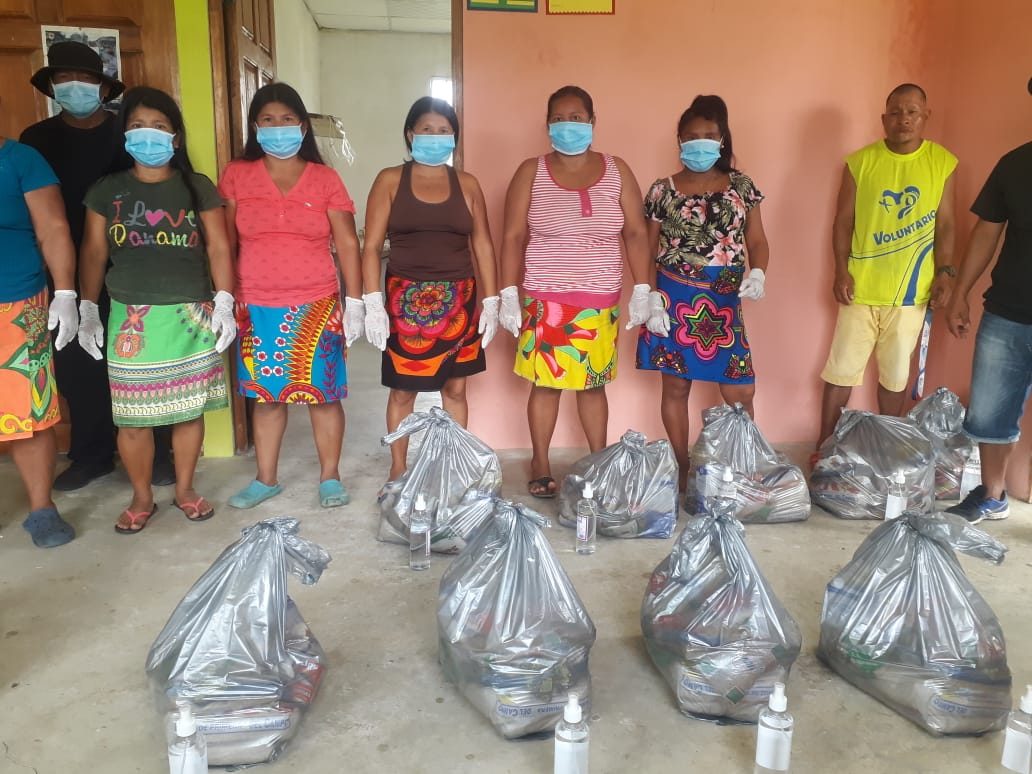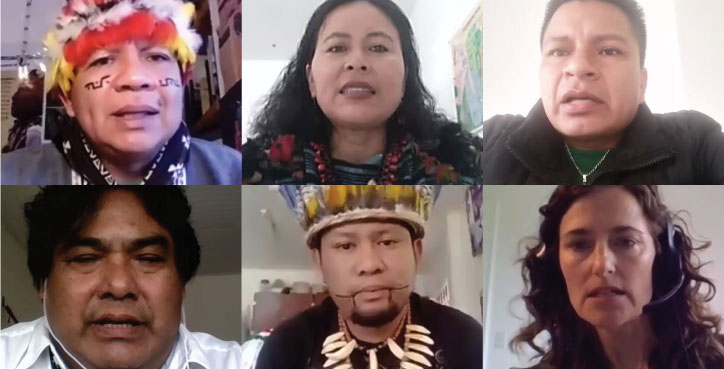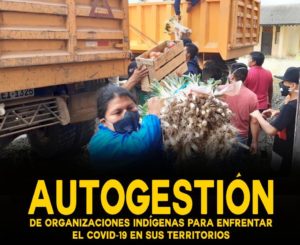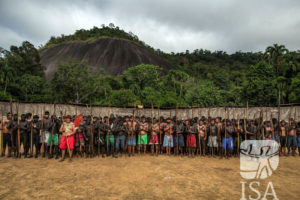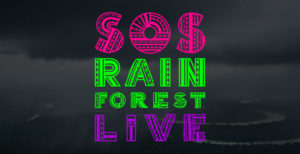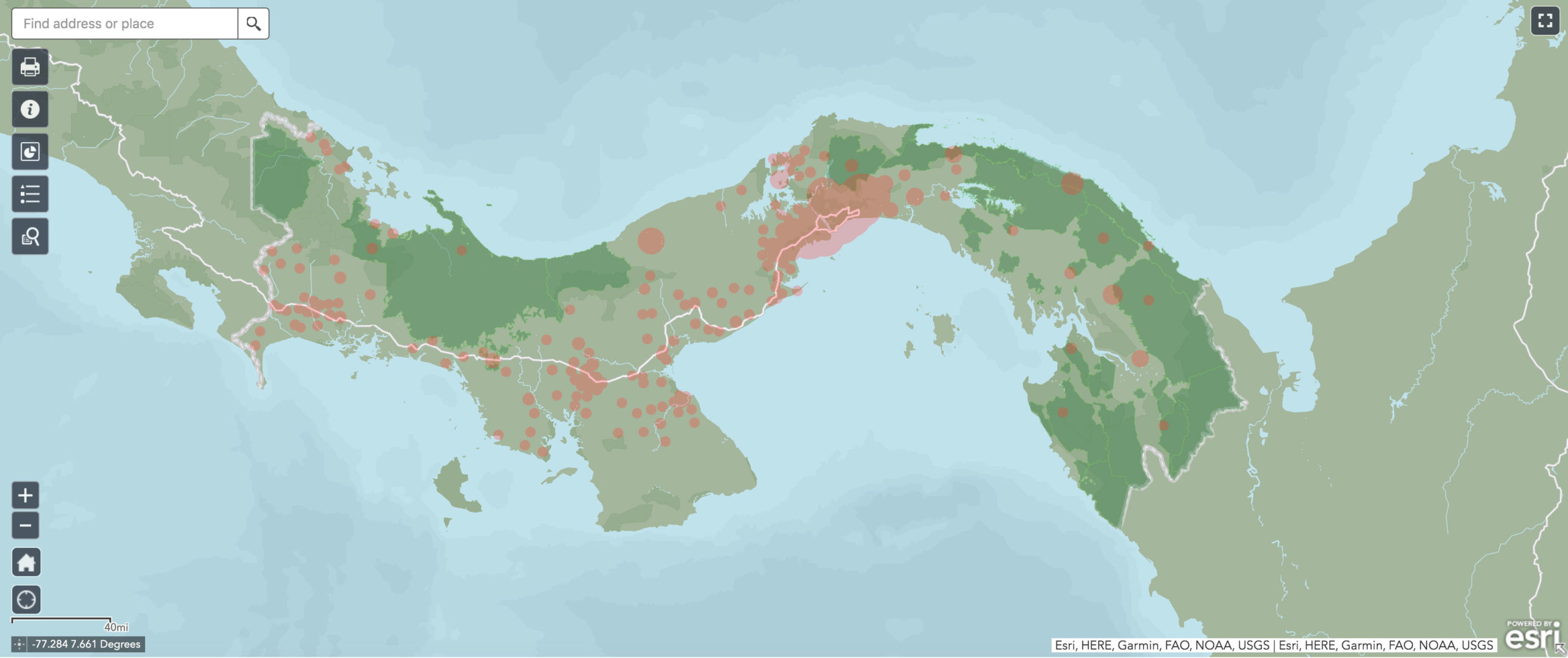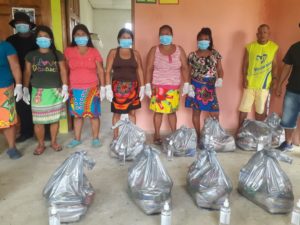Las mujeres del Congreso General de Tierras Colectivas Embera Wounaan (CGTCEW), en Panamá entregan ayuda alimentaria a las comunidades en cuarentena. Crédito: CGTCEW.
Voces de los Pueblos: Respuesta COVID-19 en el Darién, Panamá
Los pueblos Emberá y Wounaan de los bosques más orientales de Panamá se han movilizado en las últimas semanas para abordar la amenaza de COVID-19 en sus comunidades. La región no es ajena a las epidemias (y se su integridad se ha mantenido intacta gracias en parte a enfermedades infecciosas del pasado). Pero el nuevo coronavirus amenaza a la población e incrementa el paso de la deforestación en sus territorios.
Desde el 25 de marzo del 2020, cuando Panamá declaró el Estado de Emergencia Nacional, sus ciudadanos han estado bajo “cuarentena absoluta”. Las personas solo se les permite salir de sus hogares para ir al supermercado o a la farmacia. Las regulaciones sobre quién puede ir y cuándo se definen según el día y la hora, según el género de una persona y los dígitos finales de su documento de identidad. Por ejemplo, si el último dígito de la tarjeta de identidad de un hombre es un tres, puede salir durante una hora a las 3 p.m. (permitiendo un tiempo de viaje de 30 minutos en cualquier extremo) los martes, jueves o sábados solamente. Las mujeres están restringidas a lunes, miércoles y viernes; el movimiento está restringido por completo los domingos.
Rainforest Foundation US (RFUS) escuchó de Elivardo Membache, el líder electo del Congreso General de Tierras Colectivas Emberá Wounaan, o CGTCEW, una organización socio de RFUS, sobre la respuesta que han tomado para brindar alivio a sus comunidades miembros a medida que el comercio y los medios de comunicación física disminuyen bajo COVID-19. Reconocido por el gobierno panameño, el Congreso es una organización indígena representativa construida sobre estructuras de gobierno tradicionales que aboga por el bienestar de las aproximadamente cuarenta comunidades Emberá y Wounaan que habitan en el Darién.
Rainforest Foundation US: ¿Cuál es la situación actual de COVID-19 en sus comunidades?
Elivardo Membache: COVID-19 ahora mismo está afectando el estatus económico y alimentario de los pueblos indígenas en la provincia de Darién donde ya hay unos 181 casos a través de toda la población de la provincia (hasta el 8 mayo 2020).
Aquí varias personas indígenas dependen en la economía local para sus sustentos y para alimentar a sus familias. Pero ahora han quedado sin empleo. No pueden movilizarse para hacer compras. Y si pueden, se encuentran que no hay comida disponible en las tiendas.
La gente tiene miedo de ir a los centros comerciales en la carretera panamericana dónde se han confirmado la mayoría de los casos. En Arimae, hay muchos jóvenes que trabajan en los centros comerciales que han quedado sin trabajo.
Las seis comunidades en la provincia de Chagres, dentro del Área de Canal de Panamá, se dedican 100% al ecoturismo lo cual está ahora paralizado. Tienen dos meses sin actividad y son múltiples semanas ahora que no pueden comprar ni comida. En mi caso, mi familia y yo tenemos carne propia para comer. Las comunidades deben sobrevivir con lo que hay porque la ayuda no llega a las comunidades más lejanas.
En Jaque, tenemos informes de que hay mujeres y jóvenes movilizándose para viajar a Colombia en búsqueda de alimentación y suministros, y por lo tanto hay autoridades indígenas de Colombia se quejando sobre la llegada de gente de Panamá.
Rainforest Foundation US: ¿Cuál es el estatus de servicios médicos en las comunidades Emberá y Wounaan?
Elivardo Membache: Además de afrontar la crisis económica y alimentaria, las comunidades no tienen acceso a medicamentos básicos ni a los servicios médicos de los cuales dependen normalmente.
En mi área de Santa Fe, hay mujeres dando luz en sus casas. Hay niños deshidratados, con diarrea, pero sus padres tienen miedo de llevarlos al hospital donde los doctores están atendiendo a cinco pacientes positivos por el coronavirus. Y eso es solo donde hay centros de salud y hospitales cerca. En las comunidades en la frontera, hay que caminar uno a dos días para llegar a un centro de salud.
100% de las comunidades no han tenido acceso a equipos de protección personal como guantes o mascarillas, ni alcohol ni otros productos para esterilizar. Además, no hay disponibilidad en las tiendas, y el Ministerio de Salud no está distribuyendo nada.
Rainforest Foundation US: ¿Cómo han cambiado las amenazas que enfrentan en tiempos normales los pueblos indígenas durante esta crisis?
Elivardo Membache: La situación de los bosques tropicales es aún más preocupante de lo normal. Los traficantes y operadores ilegales siguen desabasteciendo el bosque. Hemos recibido noticias de que hay tala ilegal de árboles en Jaque, en Playa Muerto. Los traficantes están tomando ventaja de que las autoridades no están de pie en sus puestos regulares ya que están enfocados en otras cosas.
En Río Congo, los campesinos continúen sus prácticas de deforestación. La situación está peor que lo normal porque ahora hay sequía en los bosques. Pero la dirigencia de los pueblos indígenas está asustada y no quiere salir y presentar denuncias debido a la posibilidad de contraer el virus.
Rainforest Foundation US: ¿Cuál es la respuesta del gobierno frente a los retos de las comunidades indígenas?
Elivardo Membache: Para los pueblos indígenas frente al COVID-19, las acciones del gobierno no son tan impactantes. El Plan Solidaridad del gobierno incluye la distribución de “mega bolsas” de alimentos, pero la distribución está enfocada en la ciudad. No van a llegar a las comunidades rurales y fronterizas.
Mientras tanto, hay otra situación muy preocupante en lo que está surgiendo para las comunidades del río arriba. Ellas no quieren que la gente entre sus territorios, pero hay temor de que SENAFRONT (El Servicio Nacional de Fronteras de Panamá) se va a hacer una rotación de tropas que guardan las fronteras mientras las comunidades deben quedarse en cuarentena. Los miembros de las comunidades temen que las nuevas tropas pudiesen introducir el contagio a sus pueblos. He hablado con el comandante quien ha dicho que no van a hacer rotación de las tropas por el momento.
Rainforest Foundation US: ¿Cómo ha respondido la dirigencia indígena frente la crisis?
Elivardo Membache: Estamos difundiendo información a las comunidades sobre COVID-19, recomendando que gente queden en sus casas, no dejen entrar a la comunidad gente de afuera, y hacer uso de los medicamentos que tengan a mano. También estamos divulgando recetas de medicinas tradicionales para aliviar los síntomas del coronavirus.
Las comunidades se necesitan sal, azúcar, aceite, entre otros alimentos además de fósforos, jabón, y equipo de protección personal para prevenir o contener el virus. Por eso, como Congreso hemos organizado una recaudación de fondos y, junto con voluntarios del Feed Panama, estamos distribuyendo sacos de alimentos, mascarillas, y guantes a las comunidades aisladas de Arimae y Bajo Chiquito. Entre tanto hemos visto una historia de solidaridad emerger entre estas comunidades y sus familiares en la capital que tienen problemas ante la cuarentena y aislamiento domiciliario. A su petición como Congreso hemos coordinado también el trasporte de plátano, yuca y ñame para alimentar a esas familias.
También estamos difundiendo información al gobierno frente a la realidad de las comunidades en esta crisis. Escribimos una carta al gobierno y difundimos un comunicado de prensa, haciendo eco de las llamadas de las comunidades y pidiendo asesoría del Ministerio de Salud.
Vemos que todos estos esfuerzos son solo el inicio, pero. Si hay un brote en las comunidades, sería una situación grave. Ahora el esfuerzo es para prevenir eso.
Read More
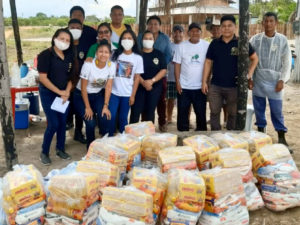
Voices from the Ground: COVID-19 Response in Roraima, Brazil
An interview with the Legal Advisor for the Indigenous Council of Roraima about adressing COVID-19 in his territory.
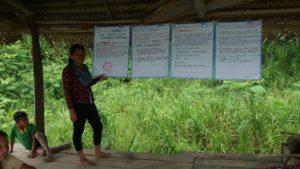
Voices from the Ground: COVID-19 Response in Loreto, Peru
An interview with two indigenous leaders about their communities’ reactions to COVID-19.
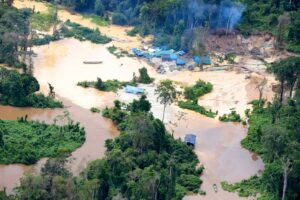
The Inter-American Commission on Human Rights Calls on Brazil to Protect the Yanomami
The Inter-American Commission on Human Rights has called on Brazil to address the COVID-19 pandemic in the Yanomami Territory.
Support Our Work
Rainforest Foundation US is tackling the major challenges of our day: deforestation, the climate crisis, and human rights violations. Your donation moves us one step closer to creating a more sustainable and just future.

